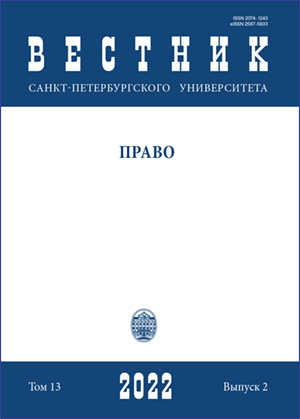Experiencing history as a factor of self-identification of states and peoples of the post-Soviet space: Legal dimension
DOI:
https://doi.org/10.21638/spbu14.2022.214Аннотация
For Armenia, Belarus, Estonia, Kazakhstan, Kyrgyzstan, Latvia, Lithuania, Moldova, the Russian Federation, Ukraine, and Uzbekistan, the basic forms of self-identification of states are described: the declaration of an official position on the assessment of historical events; the adoption of memorial laws, by which criminal liability can be established for expressing a position on facts of the past that does not correspond to the state’s position; and a policy for awards based on positive examples in the history of the country. Based on normative legal acts, officially adopted concepts and strategies, as well as a review of literature, this article identifies such models of official remembrance policy that have developed in the post-Soviet space as the defense of historical truth and historical memory, the requirement to recognize crimes committed in the past, the denial of the positive aspects of a particular stage of history, the search for state and social identity in the distant past, and its mythologization. The causes for mainstreaming history at the present stage and reflection of this process in the complex relationship of history and memory are considered. The stages of updating historical knowledge for states and peoples of the post-Soviet space are highlighted. Features of the award policy, various concepts underlying the award systems in the former republics of the Soviet Union, as well as general historical assessments of specific events and personalities are shown, even in the face of divergence of the official remembrance policy. The authors make conclusions about the adequate strategy leading to long-term results, aimed at joint experiencing the traumatic events of the past by the states and peoples, drawing lessons from them and determining ways to further development without creating an image of the enemy.
Ключевые слова:
official remembrance policy, award policy, self-identification of states, selfidentification of peoples, statutes of orders, experiencing history
Скачивания
Библиографические ссылки
Загрузки
Опубликован
Как цитировать
Выпуск
Раздел
Лицензия
Статьи журнала «Вестник Санкт-Петербургского университета. Право» находятся в открытом доступе и распространяются в соответствии с условиями Лицензионного Договора с Санкт-Петербургским государственным университетом, который бесплатно предоставляет авторам неограниченное распространение и самостоятельное архивирование.






